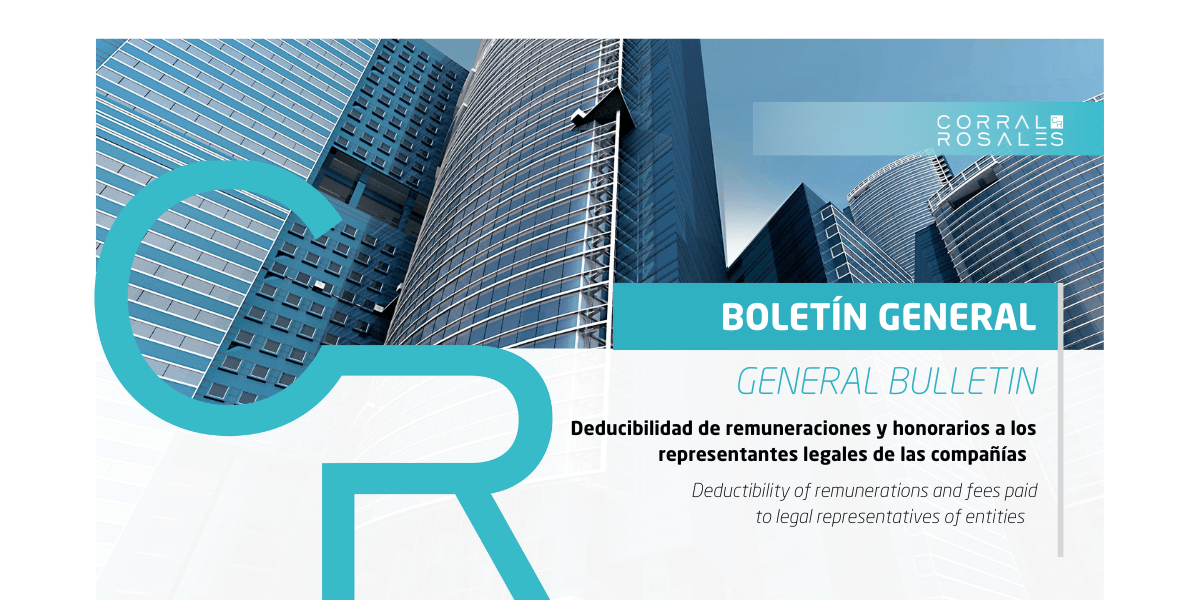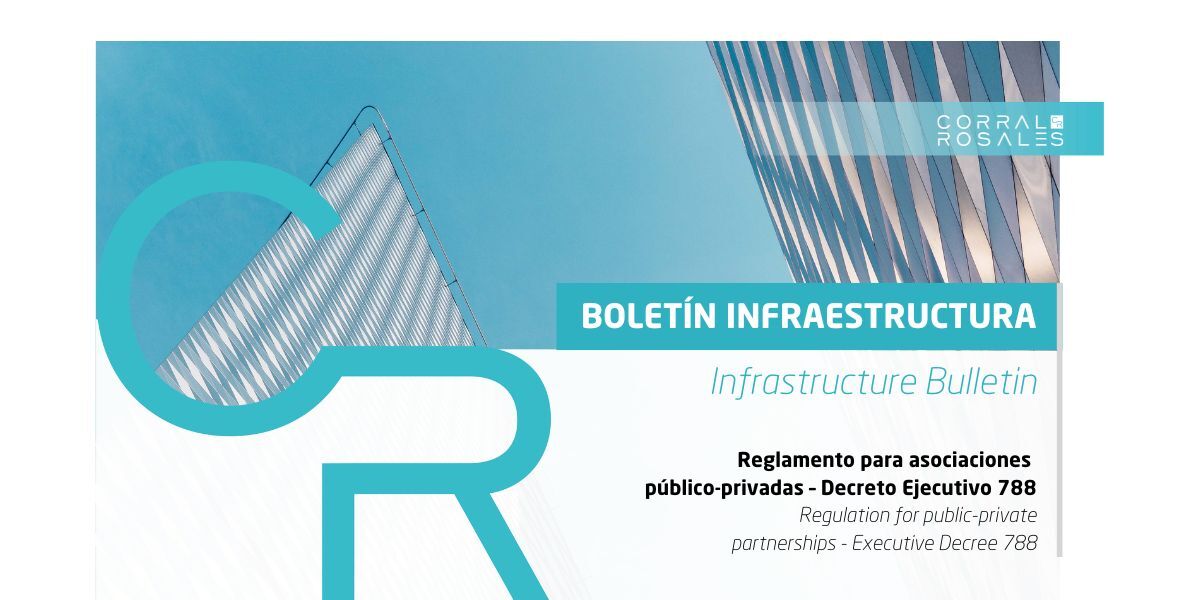By Executive Decree number 788 issued on June 26, 2023 and published in Official Gazette Supplement 341 of June 28, 2023, the President of the Republic issued the Regulations for Public-Private Partnerships (“Regulation“), on which we highlight the following.
- Overview:
Scope: The Regulation applies to Public Private Partnership (“PPP“) projects carried out by the Central Government or by the Decentralized Autonomous Governments (“GAD“). This will allow GAD to implement delegation projects under this modality, which had occurred only by exception.
Definitions: The Regulation incorporates the definition of several elements necessary for all stages of the process of a PPP contract. Some of the most relevant definitions, due to their practical usefulness, are those related to the promotion, structuring, execution, financing and evaluation of PPP projects.
The measurement of progress or degree of compliance of the Private Manager of a PPP project must be related to performance indicators or KPIs (Key Performance Indicators). These indicators may be financial or non-financial.
Institutional framework: The Interinstitutional PPP Committee (“CIAPP“) is maintained as the entity in charge of the steering and regulation of PPPs. This entity is formed by the head of the Secretariat of Public-Private Investments (“SIPP“) -who will preside it and will have the casting vote- and the heads or delegates of the following institutions: the entity in charge of production and investments, who will be the vice-president; the Ministry of Economy and Finance (“MEF“); and the entity in charge of national planning. Its main functions are to issue policies and regulations regarding the promotion of investment through PPPs as well as to coordinate actions at the central administration level.
The SIPP is also maintained as an entity attached to the Presidency of the Republic to promote, facilitate, materialize and maintain investments derived from PPPs. The Regulations establish a list of functions of the SIPP, the requirements to be appointed and the functions of the Secretary of Public-Private Investments.
The Regulation determines the functions of the Delegating Entities, among which the following stand out: preparation of the Initial and Final Business Case, execution of the PPP contracts and everything related to the management of the PPP project phases. The Delegating Entities may transfer their functions to another public administration related to the object of the PPP project. This scheme will be financed from: the budget of the Delegating Entity or from the fiduciary business set up by the SIPP. In both cases, a scheme for the recovery of costs and expenses by the successful bidder may be included; and, at the risk of the structurers, when the procedure concludes with a successful bidder and a mechanism has been established in the bidding conditions. In any case, the Delegating Entities must include in their budgets the necessary resources to comply with their obligations.
In the case of the GAD, they will exercise their institutional autonomy to assign competencies and budgets. They will require a preliminary report and opinion from the MEF when the PPP project requires any contribution from the General State Budget or when it requires the assumption of any contingent liability of the central public administration.
It also determines the functions to be performed by the MEF and the Private Manager, which must necessarily be a special purpose vehicle.
Principles: The Regulation establishes the following principles and guidelines applicable for all actors of a PPP project: integrity and probity, publicity; citizen participation, quality and efficiency, concurrence and environmental sustainability, among others. It also establishes criteria for coverage and social inclusion related to social groups, communities and nationalities, the hiring of human talent residing in the area of influence and the use of a national component in the development of PPP projects.
- About PPP Contracts
Definition: a PPP association is defined as a long-term delegated management contractual modality in which the experience, knowledge, equipment, technologies and technical and financial capacities of the private sector are incorporated, in order to fulfill one or several of the following activities: design, finance, build, improve, operate and maintain a new or existing public asset and/or provide the maintenance, administration and supplies of a public service. Under this scheme the risks are distributed between the parties, with the Private Manager assuming significant risks. The Private Manager’s consideration will be linked to its performance.
Classification: projects are classified as self-financed by the Private Manager and co-financed between the Private Manager and the Delegating Entity.
Duration and value: PPP contracts must have a term of between 5 and 30 years. Exceptionally, this term may be extended for 10 years. The minimum Total Value of a PPP project shall be US$ 20 million. In the case of the GAD it will be US$ 10 million.
Public Trust Funds: the Regulation creates the possibility for the State to have public trust funds for (i) financing preparation studies; (ii) fiscal risk coverage; (iii) liquidity to meet firm commitment obligations; and, (iv) others that the CIAPP resolves to promote the bankability of PPP projects. The assets may originate from the General State Budget, the private sector and/or reimbursable and non-reimbursable financing.
Stability and Incentives: legal stability will apply to sectoral and specific regulatory aspects declared as essential in a PPP contract. Tax incentives may be established in the investment contracts. Exemption from foreign trade taxes and foreign currency outflow taxes must be requested and justified by the Delegating Entity. Other tax incentives may be granted by the CIAPP.
- Economic-financial regime and risk allocation
Project revenues and compensation: the Private Manager will be paid through public resources, payments made by the users, payments derived from the commercial exploitation of the project or a combination of the above. In projects related to new or existing public infrastructure, payment by the Private Manager in favor of the Delegating Entity may be determined. Revenues and expenses will be administered through a commercial trust according to the type of project and the conditions established in the bidding documents, contracts and other regulations. The tariff scheme will be determined by the Delegating Entity.
Risk distribution: the risk analysis shall be performed by the Delegating Entity in order to identify, prioritize and quantify the risks associated with the PPP project and their distribution between the Private Manager and the Delegating Entity.
Financing: the Private Manager may establish the necessary guarantees to ensure the financing of the project. The Regulation establishes the general scheme of rights of the financiers in PPP projects.
- PPP Project Cycle
The Regulation determines the following phases of a PPP project:
- Planning and eligibility phase: includes the elaboration of the project profile, verification of alignment with general planning, incorporation of the project in the National PPP Registry and determination of eligibility criteria.
- Structuring phase: includes the (i) pre-feasibility studies, which must materialize in a Preliminary Technical Report issued by the Delegating Entity with which the MEF will issue a Preliminary Sustainability and Fiscal Risks Report; (ii) feasibility and transactional stage, in which the pre-feasibility studies are concluded and adjusted, the bidding documents are formulated, the draft PPP contract, among others, with which the Delegating Entity will issue the Final Business Case; (iii) public bidding, for which the Delegating Entity will determine an award variable, these variables are related to the contributions of state resources, the remuneration to the State, the tariff level, among others; and, (iv) award of the PPP contract, from which the successful bidder will have 90 days to confirm compliance with all the necessary conditions such as the incorporation of a sole purpose company and the presentation of insurance and guarantees for the execution of the PPP contract.
- Execution and management phase of the PPP contract: includes the provision of infrastructure and/or services object of the PPP contract, the supervision of the execution by the Delegating Entity and the articulation of coordination actions between the parties. The creation of one or more commercial trusts for the administration of all the income and expenses of the project is determined. The Private Manager must report periodically on its performance and the Delegating Entity will publish its performance reports annually in the National PPP Registry.
- The Regulation also establishes the rules for the suspension, termination and liquidation of PPP contracts. At the end of the Contract, the assets will revert to the Delegating Entity.
Private initiative: private initiatives must be submitted within the timeframe determined by the CIAPP and always aimed at satisfying a need in accordance with the plans or policies established by the respective level of government. The proponent will assume the totality of the costs of the development of its proposal. The Delegating Entity may declare a private initiative to be of public interest or reject it for cause. If a declaration of public interest is issued, pre-feasibility studies may begin. In 2023 private initiatives may be submitted between July and September, in 2024 between January and March and between July and September.
Prequalification: The Delegating Entity may use a prequalification system when it considers that its amount or complexity could limit the number of bidders.
Dispute Resolution: the PPP contract shall provide for a tiered dispute resolution mechanism. The parties may agree that disputes of a technical nature shall be heard by a Combined Dispute Board whose decisions shall have binding effect.
Reformatory and Derogatory Provisions: the Regulation includes reformatory provisions to the General Regulation of the Organic Code of Planning and Public Finances, mostly related to the determination and management of fiscal risks. The rule that any modification to a PPP contract under execution will require the opinion of sustainability and fiscal risks issued by the MEF is maintained. The 3 Executive Decrees that regulated this matter are expressly derogated.
Would you like to receive our newsletters with information like the one you have just read?
Click here and subscribe.






















